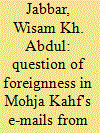| Srl | Item |
| 1 |
ID:
134013


|
|
|
|
|
| Publication |
2014.
|
| Summary/Abstract |
This paper examines foreignness in Mohja Kahf's poetry volume, E-mails from Scheherazad (2003), as a celebratory commodity rather than a literary trope to resist Arab women representations or to accentuate exilic voices. Drawing on Julie Kristeva's conceptualization of foreignness as internal personae and not a projection of an external locus of identity, this paper explores how the speakers in some of Kahf's poems view foreignness as festive rather than negative. In sharp contrast to the traditional conception of difference as publicly alienating, foreignness to the Arab-American speakers becomes a distinctive mark that they uphold and celebrate. Examining foreignness in Kahf's poems through Kristeva's lens provides a sense of uniqueness to the immigrant's experience. The notion of recognizing the foreigner in ourselves, that Kristeva provides, subverts the general perception of foreignness as external and intruding. Kahf's poetry can be perceived as a negotiation of foreignness, which is not an estranging element that incurs resistance but rather as a celebratory part of the human consciousness that should be jubilantly defined rather than politically defended.
|
|
|
|
|
|
|
|
|
|
|
|
|
|
|
|
| 2 |
ID:
125912


|
|
|
|
|
| Publication |
2013.
|
| Summary/Abstract |
The literature on transnationalism has emphasised the ways that citizenship practices can transcend borders, for example, enabling migrants to use resources acquired outside of their country of origin to engage politically within it. This literature has not, however, addressed how migrants fall outside of rather than transcend national boundaries. To analyse this condition, we develop the concepts of transnational alienage and foreignness and apply them to the experiences of two groups: (1) US Foreign Service Officers (FSOs) stationed in Central America and Mexico and (2) long-time US residents who were deported to El Salvador. Though positioned quite differently, there are also surprising intersections in FSOs' and deportees' social locations. These intersections shed light on the forms of citizenship and alterity created by the transnational security regimes in which both FSOs and deportees are situated. Our analysis draws on interviews conducted in the US, Mexico and Central America between 2008 and 2010.
|
|
|
|
|
|
|
|
|
|
|
|
|
|
|
|